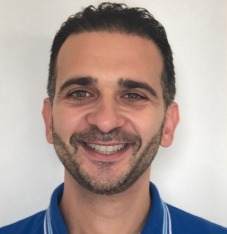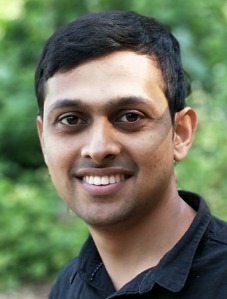Impact: Intelligente tool helpt bij opsporen kindermisbruik

De komende weken introduceren de genomineerden voor de Ben Feringa Impact Award 2023 zichzelf en hun impactvolle onderzoek of project. Deze week: George Azzopardi samen met zijn promovendus Guru Bannabhaktula genomineerd in de categorie onderzoeker voor hun project 4NSEEK ‘Forensic Against Sexual Exploitation of Children.’
Wie ben je?
Mijn naam is dr. George Azzopardi en ik ben tenure track-universitair docent informatica. Ik ben lid van de afdeling Informatiesystemen van het Bernoulli Instituut. Mijn onderzoek gaat met name over op de hersenen geïnspireerde patroonherkenning en beeldopvraging. Mogelijke toepassingen hiervan liggen op het vlak van de forensische, (bio-)medische en radioastronomische beeldanalyse. Ik heb als co-promotor gefungeerd voor vijf promovendi, en op dit moment ben ik co-promotor voor nog eens vijf promovendi. Een van hen is Guru Bennabhaktula, die een essentiële rol heeft gespeeld in het project 4NSEEK.
Welke faculteit?
Faculty of Science and Engineering
Kun je uitleggen waar je onderzoek over ging?
Ik stond aan het hoofd van een workpackage (WP) binnen het project 4NSEEK, ‘Forensic Against Sexual Exploitation of Children’, dat deels werd gefinancierd door het EU Internal Security Fund programma. Dit project stond in het teken van de ontwikkeling van een AI-tool waarmee handhavingsautoriteiten beeldmateriaal van seksuele uitbuiting van minderjarigen konden onderzoeken. De twee belangrijkste doelstellingen van de WP waren: 1) herkennen met welk apparaat of welk model camera het bestudeerde beeldmateriaal was gemaakt, en 2) vaststellen of een bepaalde set afbeeldingen/video's wel of niet met dezelfde apparatuur was gemaakt. Om dit soort camera-identificatie mogelijk te maken, moet de ruis van de camerasensor worden geregistreerd zonder de inhoudelijke ruis van het opgenomen materiaal mee te nemen. Dit probleem hebben we opgelost met onze nieuwe methoden, waarmee we binnen ons vakgebied een nieuwe standaard hebben gezet.

Waarom heeft dit onderzoek impact en wat heeft de maatschappij eraan?
De impact van dit hele project is dat we nu sporen uit foto's en video's kunnen halen, aan de hand waarvan we vervolgens kunnen bepalen met welke camera de beelden zijn gemaakt. Dat is een beetje hetzelfde als in een moordzaak het pistool identificeren waarmee de kogel werd afgevuurd. Met dergelijke algoritmes, zoals die ook in het project 4NSEEK zijn gebruikt, kunnen handhavingsautoriteiten beeldmateriaal van seksuele uitbuiting van minderjarigen efficiënter en nauwkeuriger onderzoeken, en zodoende een sterkere zaak opbouwen tegen verdachten. Bovendien kunnen de ontwikkelde algoritmes ook elders worden gebruikt, bijvoorbeeld in het opsporen van ‘face morphing attacks’, waar wij samen met de Rijksdienst Wegverkeer (RDW) aan gaan werken.
Waarom wilde je dit onderzoek doen, en wat heb je ervan geleerd?
Ik vond het een boeiend onderzoeksonderwerp waarbij ik allerlei specifieke obstakels op het gebied van patroonherkenning te lijf kon gaan, maar daarnaast werd ik zelf net in die tijd vader. Daardoor was ik extra gemotiveerd om te helpen de wereld veiliger te maken, vooral voor kinderen. Dit project heeft me op diverse gebieden waardevolle inzichten en leerervaringen gegeven. Zo heb ik ervaring opgedaan met holistische probleembenadering – ik heb bijvoorbeeld samengewerkt met stichtingen voor slachtoffers, maar ook algoritmes volgens de industriestandaard (op 'Technology Readiness Level' 9) opgeleverd. Ook het publiceren van de projectresultaten via verschillende media was een waardevolle ervaring, die onder meer heeft geresulteerd in een nieuwe samenwerking met de RDW. Al met al heb ik in dit project geleerd samen te werken met verschillende partners, complexe problemen integraal te benaderen en onderzoeksresultaten effectief te publiceren.
Meer nieuws
-
10 februari 2026
Waarom slechts een klein aantal planeten geschikt is voor leven
-
09 februari 2026
Kunnen we de aarde de andere kant op laten draaien?
